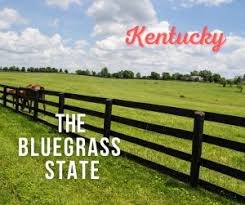Exploring Kentucky: The Bluegrass State
Kentucky, nestled in the heart of the United States, holds a unique distinction among its counterparts – it is famously known as the Bluegrass State. This moniker originates from the lush bluegrass found in many of its pastures due to its fertile soil and favorable climate. Let’s delve deeper into the rich heritage and significance of this vibrant state.
The state’s economy flourished in the 19th century with the rise of agriculture, particularly the cultivation of tobacco and hemp. Kentucky’s role in the Civil War was pivotal, torn between Union and Confederate sympathies. Post-war, the state experienced rapid industrialization and urbanization, shaping its modern identity.

Why This News is Important
Understanding Kentucky’s nickname, the Bluegrass State, is not merely about geography; it encapsulates the essence of its cultural, historical, and economic significance. For students preparing for government exams, grasping such nuances enriches their understanding of regional dynamics within larger geopolitical contexts. Moreover, this knowledge fosters a holistic perspective essential for effective governance and policymaking.
Historical Context
Kentucky’s history is as diverse as its landscapes. Initially inhabited by Native American tribes, notably the Cherokee, Shawnee, and Chickasaw, the region saw European exploration in the 17th century. The first European settlement was established by Englishman James Harrod in 1774. Kentucky’s strategic location and fertile land made it a battleground during the American Revolutionary War and the War of 1812.
5 Key Takeaways from “Exploring Kentucky: The Bluegrass State”
| Serial Number | Key Takeaway |
|---|---|
| 1. | Kentucky is renowned as the Bluegrass State due to its lush pastures. |
| 2. | The state’s history is marked by Native American settlement, European exploration, and Civil War conflicts. |
| 3. | Kentucky’s economy thrived in the 19th century with agriculture and later witnessed industrial growth. |
| 4. | The state’s nickname reflects its cultural heritage and economic prowess. |
| 5. | Understanding regional identities like Kentucky’s is crucial for a comprehensive understanding of American history and governance. |
Important FAQs for Students from this News
Q1: Why is Kentucky called the Bluegrass State?
A1: Kentucky is known as the Bluegrass State due to the abundant bluegrass found in its pastures, which gives them a distinctive bluish hue.
Q2: What is the significance of Kentucky’s nickname for government exam aspirants?
A2: Understanding Kentucky’s nickname is important for aspirants as it reflects the state’s cultural heritage, economic activities, and historical background, which are relevant for various competitive exams.
Q3: How did Kentucky’s history shape its modern identity?
A3: Kentucky’s history, marked by Native American settlements, European exploration, Civil War conflicts, and subsequent industrialization, played a crucial role in shaping its modern identity as a diverse and culturally rich state.
Q4: What are some key takeaways for government exam preparation from the article?
A4: Key takeaways include Kentucky’s nickname and its significance, historical background, economic development, and the importance of understanding regional identities in the context of American history and governance.
Q5: How can knowledge about Kentucky benefit aspirants beyond exams?
A5: Beyond exams, understanding Kentucky’s history and cultural significance fosters a broader understanding of regional dynamics within the United States and enriches one’s perspective on governance and policymaking.
Some Important Current Affairs Links

















